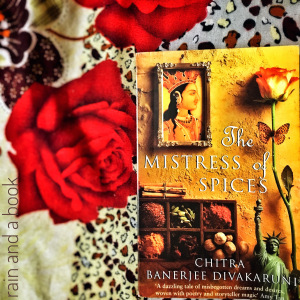“Ahuja’s wife has of course a name. Lalita. La-li-ta, three liquid syllables perfect-suited to her soft beauty. I would like to call her by it, but how can I while she thinks of herself only as a wife.”

The Mistress of Spices is the story of Tilo, who was born in an Indian village, and bore a different name, before she discovered she had certain powers with which she could summon those she thought of. Unfortunately for her, she accidentally summons a group of pirates who abduct her. However, soon, with her talents, she turns the tables on them and becomes their queen. She then hears the about an island, where an old woman lives, and imparts the knowledge of spices to those who have the gift needed to communicate with the spices. Those who have this gift are known as Mistresses.
At the end of their training, each Mistress is given a new name and is sent to a different part of the world, where they are to help people with the power of the spices. Tilo chooses her own name, and against the wishes of the Old One, wishes to go to USA. She then wakes up in the body of an old woman, in an Indian store in Oakland. Her customers include various Indian immigrants trying to make a living in the States, and she figures what each of them needs before offering it to them.
I was enthralled in the beginning. The way Tilo sensed what everyone needed reminded me of Vianne from Joanne Harris’ Chocolat, and the way the spices were described to have healing powers reminded me of Laura Esquivel’s Like Water For Chocolate. So taken was I by these descriptions that I recommended the book to others even before finishing it. By the half way mark, however, I realized I’d spoken too soon.
The prose that seemed enchanting in the beginning quickly turns irritating. Nearly everything has been described with superlatives, hyperbole, similes and metaphors. The good prose wears off and begins to grate. This results in the work being overly wordy and bloated. By 3/4th of the book I just wanted it to end, because the themes that had interested me in the beginning had been abandoned in favor of the forbidden love affair between Tilo and Raven. The writing that had been so convincing began to fall flat, and I started questioning everything without finding satisfactory answers.
The ending was weak and seemed forced. There were so many other better ways it could have gone. I’m also left with a lot of unanswered questions, unmet conclusions. The Mistress of Spices takes too many themes, but in the end fails to do justice to any, because it focuses on the weakest link in the story. I’m almost sad to see so much potential wasted.
Goodreads | Amazon
Advertisements Share this:
- Book Review





